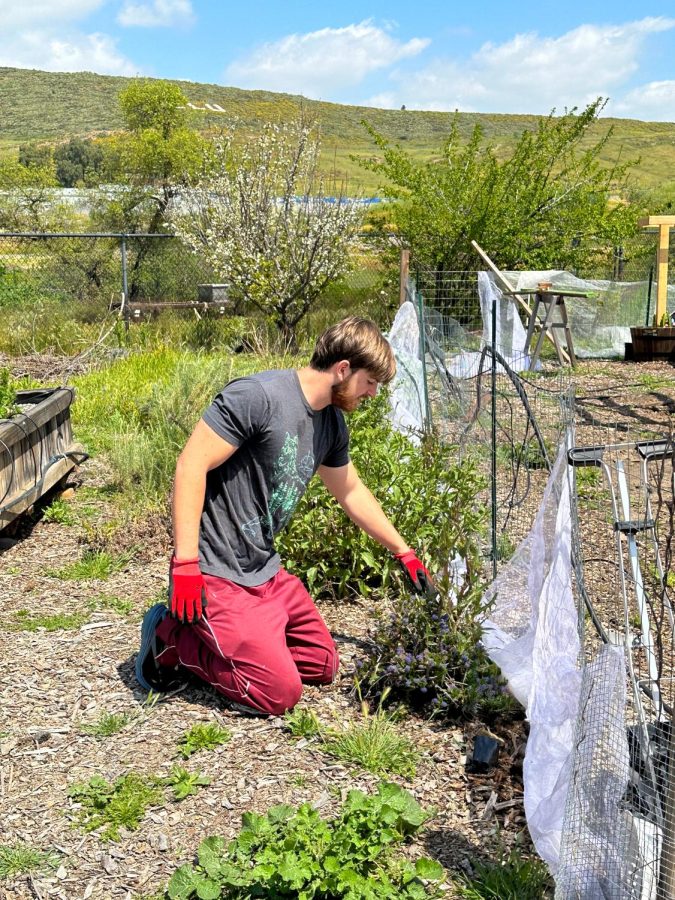Cal Lutheran celebrates Earth Week
As a part of the Civic Engagement and Leadership series, California Lutheran University hosted Earth Week: California A Biodiversity Hotspot. This event was held at the university SEEd garden where attendees planted Southern California plants, painted signs for the garden and ended the day with a celebratory lunch.
April 25, 2023
California Lutheran University’s Civic Engagement & Leadership hosted multiple events on campus for Earth Week that focused on recycling, teaching students ways to live a more sustainable life and planting Southern California native plants.
“When we’re focused so much on what events are going on in the world, I think people forget that the Earth is dying. I think Earth Week is a nice reminder of ways to protect the Earth and save it from danger,” Civic Engagement & Leadership Student Intern Liban Yakob said.
Civic Engagement & Leadership kicked off Earth Week with Meatless Monday. This event, held at the flagpoles, allowed students to learn about how they can practice a sustainable diet by implementing a day without meat into their week.
“For me, Meatless Monday is about promoting how important it is that if you just eat one day of the week without meat it is so beneficial to the planet,” Yakob said.
After answering a trivia question correctly, participants had the chance to win either a purple tote bag or an Earth stress ball. The first 50 students to participate also received a ticket to Foodie Friday.
“Educate yourself and learn about ways that you could help even in the little things you do day to day. Things like food waste that you could easily take two more seconds of your day to fix, it’s very beneficial in the long run,” Yakob said.
Throughout Earth Week, Civic Engagement & Leadership held a friendly competition between commuter students and each residence hall. From April 17-21, students could recycle their plastic bottles and aluminum cans in the recycling bins located in the residence halls and student union.
In an email interview, Residence Assistant Carissa Melton said, “I feel this is a good idea for the residence halls to be involved, and it will be interesting to see if we will continue to do so after Earth Week is over. As a resident assistant, I feel like this would have been a good RA program to do for residents, and it is awesome for it to be campus-wide.”
All of the money raised from the recycling competition will go towards sustainability efforts on Cal Lutheran’s campus.
“I feel like the people who partake in the competition will reflect upon their consumption of products and how to reduce waste in their own lives and bring it back to their social networks. Maybe Cal Lutheran as a whole will implement these around campus and keep them in the residence halls if a lot of people campus-wide participate,” Melton said.
The group that collected the most bottles and cans would be awarded a free pizza party. That specific residence hall or commuter students would also have bragging rights for recycling more than the rest.
“It might challenge them to think about separating their recyclables more when throwing things away. Also, we can all learn how to be more environmentally friendly, which gives a chance for growth within that area of life,” Melton said.
Civic Engagement & Leadership also held an event in the Sustainable Edible Education Project garden. Participants could plant Southern California native plants and paint SEEd garden signs while enjoying lunch.
Megan Fung, a professor in the Earth and Environmental Science Department who participated in gardening during the Earth Week event, said in an email interview that Earth Week is important to celebrate because its an opportunity for people to engage with their surroundings, and to educate others about sustainability, green living and “finding ways to combat the climate crisis.”
“In the SEEd Garden, we strive to be an advocate and educator for organic gardening, composting, native plants, and pollinators. We also hope to be a place on campus where people can engage in these efforts while building community with each other and the land,” Fung said.
Earth Week events concluded with a fair trade showcase held in Kingsmen Park during Foodie Friday. Civic Engagement & Leadership partnered with Ascension Lutheran Church, Tlalipani and Earth Society Club for this event. Students could purchase fair-trade products such as chocolate and tea to participate in ethical trading practices that support producers in developing countries.




















